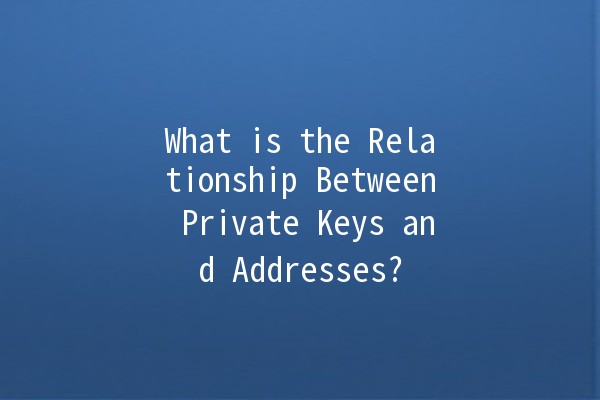
In the world of cryptocurrencies, understanding the relationship between private keys and addresses is crucial for anyone looking to engage in secure transactions. Private keys serve as secret codes that allow users to access and control their digital assets, while addresses function as public identifiers that facilitate the transfer of these assets. This article will explore the inherent connection between private keys and addresses, the importance of safeguarding private keys, and practical tips for ensuring the security of your cryptocurrency holdings.
What is a Private Key?
A private key is a cryptographic key that acts as a password to unlock your cryptocurrency wallet. It is typically a long string of letters and numbers generated when you create a wallet. This key is essential for signing transactions and proving ownership of your assets.
Importance of Private Keys
Private keys are critical because they provide access to your assets. If someone obtains your private key, they can transfer your funds without your consent. Therefore, securing your private key should be a top priority for any cryptocurrency user.
Example of Private Key Usage
When you want to send cryptocurrency to another person, you must sign the transaction with your private key. This action verifies your ownership and allows the transaction to be processed on the blockchain. Without the correct private key, you cannot authorize a transfer.

What is a Cryptocurrency Address?
A cryptocurrency address is a hashed version of your public key, which serves as a destination for cryptocurrency transactions. While anyone can see the address, only the owner of the associated private key can access the funds tied to that address.
Characteristics of a Cryptocurrency Address
Public Information: Addresses can be freely shared with others.
Anonymity: Addresses do not contain personal information, providing a level of anonymity in transactions.
Format: Different cryptocurrencies use different address formats. For example, Bitcoin addresses often start with a '1' or '3', while Ethereum addresses typically start with '0x'.
Example of an Address Usage
When someone wants to send you Bitcoin, they need your Bitcoin address. By entering that address into their wallet, they can initiate the transaction, which will then be verified and executed on the blockchain.
The Relationship Between Private Keys and Addresses
The relationship between private keys and addresses is fundamental to how cryptocurrencies operate:
Five Practical Tips for Securing Your Private Keys
Explanation: Hardware wallets store private keys offline, making them less vulnerable to online attacks.
Example: Trezor and Ledger are popular options that offer enhanced security for managing cryptocurrencies.
Explanation: Adding an extra layer of security makes it harder for unauthorized users to access your wallet.
Example: Use 2FA apps like Google Authenticator or Authy to secure your exchange accounts.
Explanation: Regularly back up your private keys and wallet data to avoid losing access due to hardware failure.
Example: Store backups in multiple secure locations, such as a safe deposit box or encrypted USB drive.
Explanation: Public networks can expose you to security risks and potential hacks.
Example: Use a VPN when accessing your wallet or making transactions on public WiFi.
Explanation: Keeping your wallet software updated ensures you have the latest security features and fixes.
Example: Enable automatic updates for your wallet applications to ensure they are always secure and up to date.
FAQs About Private Keys and Addresses
Losing your private key essentially means losing access to your associated cryptocurrency address and the assets contained within. Unlike traditional banking systems, there is no way to recover a lost private key in a decentralized system. Always ensure that you back up your private keys securely.
No, you should never share your private key with anyone. Sharing your private key compromises your security and allows others to access your funds. Always keep your private key confidential and secure.
No, each cryptocurrency uses its own unique method of generating private keys. While the concept remains the same, the technical implementations vary. Therefore, private keys generated for one cryptocurrency cannot be used for another.
Exchanges typically store user funds in hot wallets, which are connected to the internet and more vulnerable to attacks. Many reputable exchanges use cold storage for the majority of their funds, which is offline and more secure, but ultimate security still lies in managing your own private keys.
Mnemonic phrases are humanreadable words that can be used to back up and restore your wallet. They are generated from your private keys using a specific algorithm, making it easier to remember. Always keep your mnemonic phrase secure, as it provides access to all associated private keys.
You cannot change a private key associated with an existing cryptocurrency address. If you want a new private key, you will need to create a new wallet, which generates a new address with a new private key.
Understanding the intricate relationship between private keys and addresses is essential for anyone navigating the world of cryptocurrencies. Protecting your private key is crucial to safeguarding your digital assets, and employing best practices can significantly enhance your security. By implementing the tips provided above and remaining vigilant, you can confidently participate in cryptocurrency transactions while keeping your assets safe. Take control of your digital financial future by prioritizing security and understanding the tools at your disposal.

